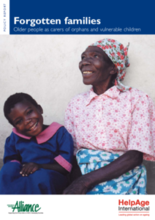As the HIV/AIDS epidemic strikes at the heart of family and community support structures, large numbers of older people are assuming responsibility for bringing up orphans and vulnerable children. Family structures are changing. Often the middle generation – both men and women – is completely absent, leaving the old and young to support each other.
This means that families of older carers and orphans and vulnerable children are compelled to take on new roles. Older people make up a significant proportion of the poorest, and HIV/AIDS exacerbates the extreme poverty faced by older-headed households. This compromises the ability of older carers to care adequately for children (as they face difficulties obtaining sufficient food, clothes and shelter), and limits their access to health care and education services. The financial burden of caring for children means older carers are often forced to sell their assets or borrow money.
Nevertheless, mutually supportive relationships between older carers and orphans and vulnerable children are being forged as a result of the epidemic. While difficult economic conditions can undermine these relationships, the advantages of keeping children with their remaining family members, whenever possible, are evident. This report shows that – provided appropriate support is available – older people and orphans and vulnerable children can overcome some of the challenges posed by the HIV/AIDS epidemic. The case studies featured in this report describe innovative ways of dealing with some of the difficulties faced by older-headed households. These community-driven programmes powerfully demonstrate the impact that minimal additional resources and appropriate technical support can have. They cover a wide range of responses, including the use of non-contributory pension schemes in South Africa, home-care services in Zambia (which have enabled families to stay together), and training for older people to be counsellors in Sudan. In Vietnam, older people’s clubs, led by local leaders, are helping older people to cope with the stigma and discrimination in their communities.

